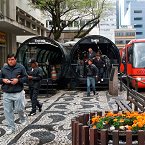The Brazilian city of Curitiba has developed a model for successful functioning and development, having learned to solve a wide range of problems: from transport and economic to social and environmental. The experience gained by this city is being studied and adopted in different countries, both in neighboring and distant regions of the world, including more developed ones.
Huge metal containers were placed along the borders of the favelas. They were labeled with wide labels that said “glass”, “paper”, “plastic”, “bio-waste”, etc. For those who could not read, they were also painted in different colors. Anyone who brought a full bag of sorted garbage was given a bus ticket, and for biowaste they were given a plastic card that could be exchanged for a bag of fresh fruits and vegetables.
In recent years, the private sector has handled most of the distribution of tickets. Corporations issued 50% of the tickets to their employees. In parallel, the share of fruits and vegetables in exchange for garbage increased. On holidays, in exchange for “junk money,” festive dishes were given. The school's garbage collection program made it possible to provide notebooks for the poorest students.
Soon tens of thousands of children were cleaning out the area, they quickly learned to recognize the different types of plastic. And their parents began to use the received bus tickets to get to the downtown area where they worked.
From my point of view, Jaime Lerner just invented new money. His bus tickets and meal cards are a form of additional currency. His program "Trash That Isn't Trash" might well be dubbed "Trash That Is Your Money." Today, 70% of homes in Curitiba are involved in this process; The 62 poorest districts exchanged 11,000 tons of garbage for nearly a million bus tickets and 1,200 tons of food. The paper waste sent there for recycling saves 1,200 trees from being cut down every day.
It should be noted that the Lerner team did not set out to improve the monetary system. They only used an integrated approach to solve the main current problems, which spontaneously led to the consciousness of an additional currency.
Bus coupons and shopping cards are not the only type of local money in Curitiba that has emerged from this approach to garbage collection. For example, a different system was introduced specifically for the restoration of historic buildings, the creation of green areas and the construction of municipal housing and the reduction of city treasury expenses. They called it solcriado (literally - an artificial surface), but here's how it works.
The success of Curitiba caused internal immigration to it, so that the population of the city grew faster than in the state of Paraná and in the whole country. The practice of using a common national currency in combination with a well-thought-out additional currency has been going on for more than 25 years. This approach allowed the third world city to reach the standard of living of highly developed countries in the lifetime of one generation.
I want to say that choosing this simple city back in the years of not such activity was only saving money. But now that the city has really changed. It became like a second Las Vegas, only of an ecological nature. It's nice and cozy here. Warm and really want to live here. I think we can share my apartment for two and live together, lol😜💋😜💋😜💋.
Quick Search

Prices & Services
Letters from 2$
Fast Gift Delivery
2-way Video Chat
5 Membership Levels
View all rates
